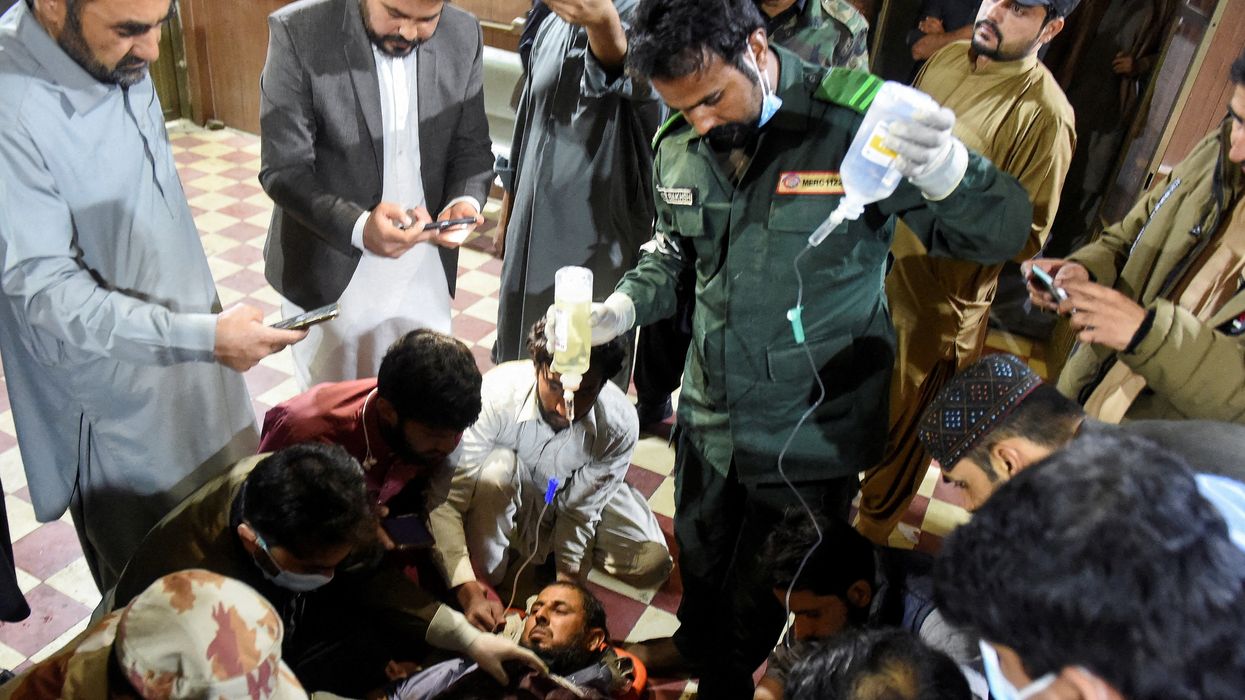PAKISTAN security forces launched a "full-scale" operation on Wednesday to rescue train passengers taken hostage by militants in the southwest, security sources said. Over the past 24 hours, 155 hostages have been freed.
The train, carrying more than 450 passengers, was seized at the entrance of a tunnel in a remote frontier district. An unknown number of hostages remain captive.
"Information suggests that some militants have fled, taking an unknown number of hostages into the local mountainous areas," a security official told AFP.
The militants bombed a section of the railway track and stormed the train on Tuesday afternoon in Balochistan province, which borders Iran and Afghanistan. Attacks by separatist groups in the region have increased in recent months.
Security sources said the "terrorists have positioned suicide bombers right next to innocent hostage passengers."
Three people, including the train driver, have been killed in the attack in Sibi district.
A security official told AFP that a "full-scale operation" was being carried out to rescue the remaining hostages.
"Security forces have safely rescued 155 passengers... 27 terrorists have been eliminated," a security source said. Among those freed were at least "31 women and 15 children." The exact number of people still on board remains unclear.'
Muhammad Kashif, a senior railway official in Quetta, said on Tuesday that all 450 passengers had initially been taken hostage.
Some of those freed described walking for hours through mountainous terrain to reach safety.
"I can't find the words to describe how we managed to escape. It was terrifying," said Muhammad Bilal, who had been travelling with his mother on the Jafar Express, speaking to AFP.
The Baloch Liberation Army (BLA), a separatist group, claimed responsibility for the attack. The group has carried out several recent attacks targeting security forces and non-local ethnic groups.
The BLA has demanded an exchange of hostages for its imprisoned members.
Authorities have restricted access to some parts of Balochistan, where several energy and infrastructure projects are backed by China. China has invested billions in the region, including in a major port and airport.
Hostages targeted by ethnicity
The train driver, a police officer, and a soldier were killed in the attack, according to paramedic Nazim Farooq and railway official Muhammad Aslam.
One of the released passengers said the gunmen checked identity cards before targeting people from outside the province, a pattern seen in previous BLA attacks.
"They came and checked IDs and service cards and shot two soldiers in front of me and took the other four to... I don't know where," said one passenger, who asked not to be named. He walked for four hours to reach the nearest station.
"Those who were Punjabis were taken away by the terrorists," he said.
Around 80 freed passengers were taken to Quetta under "tight security," a police official said.
Rising insurgency
The BLA claims the region’s natural resources are being exploited by outsiders and has intensified attacks on people from other parts of Pakistan.
Last year, the group carried out coordinated overnight attacks, including taking control of a highway and killing travellers from other ethnic groups.
Punjabi and Sindhi labourers, security forces, and foreign infrastructure projects have been frequent targets.
In February, the BLA claimed responsibility for an attack that killed 17 paramilitary soldiers. A woman suicide bomber also carried out an attack this month, killing a soldier.
"The valuable natural resources in Balochistan belong to the Baloch nation," the group said in a statement at the time.
"Pakistani military generals and their Punjabi elite are looting these resources for their own luxury."
Baloch residents regularly protest against what they say is a state crackdown on innocent people in the name of counter-militancy operations.
Pakistan has been battling a decades-long insurgency in Balochistan. Violence in the province surged last year compared to 2023, according to the Centre for Research and Security Studies.
The think tank reported that 2024 was the deadliest year for Pakistan in a decade, with violence increasing along the Afghanistan border since the Taliban took power in Kabul in 2021.
Pakistan accuses its neighbours of providing safe havens for militant groups to plan attacks, a charge Afghanistan denies.
(With inputs from agencies)





